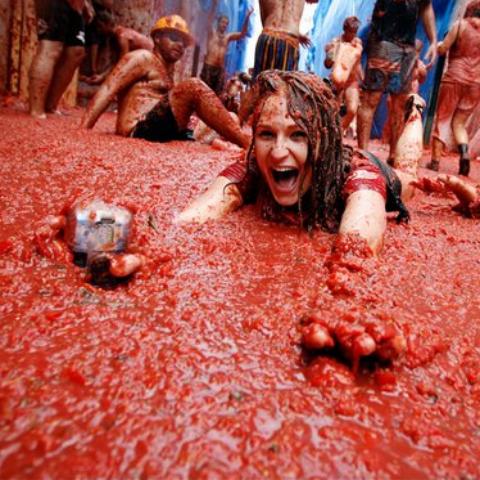THROW TOMATOES at La Tomatina
 La Tomatina is a festival held on a Wednesday towards the end of August in the town of Bu?ol in theValencia region in Spain . Tens of thousands of participants come from all over the world to fight in a harmless battle where more than one hundred metric tons of over-ripe tomatoes are thrown in the streets.
La Tomatina is a festival held on a Wednesday towards the end of August in the town of Bu?ol in theValencia region in Spain . Tens of thousands of participants come from all over the world to fight in a harmless battle where more than one hundred metric tons of over-ripe tomatoes are thrown in the streets.The weeklong festival features music, parades, dancing, and fireworks. On the night before the tomato fight, participants of the festival compete in a paella cooking contest.
Approximately 30,000 people come to the tomato fight, multiplying by several times Bu?ol’s normal population of 9,000. There are not many accommodations for people who come to La Tomatina , and thus many participants stay in Valencia and travel by bus or train to Bu?ol, about 38 km outside the city. In preparation for the dirty mess that will ensue, shopkeepers cover their storefronts in order to protect them from the carnage.
At around 11 a .m., the first event of the Tomatina begins. A ham is placed upon a cockaigne pole (a large, greased pole), and the tomato fight can begin only when someone is able to climb to the top and bring it down. People struggle against each other, climbing atop one another, in order to be the one to pull down the ham. With this victory, the tomato-throwing begins.
Many trucks haul the bounty of tomatoes into the center of the town, Plaza del Pueblo. The tomatoes come from Extremadura, where they are less expensive. The signal for the beginning of the fight is firing of the cannon, and the chaos begins. Once it begins, the battle is generally every man for himself. Those who partake in this event are strongly encouraged to wear protective safety goggles and gloves. In addition, they must squish the tomatoes before throwing for safety precautions. Another rule is that no one is allowed to bring into this fight anything that may provoke someone into a more serious brawl, such as a glass bottle. It is highly frowned upon to tear someone else’s clothing. Somewhere between an hour and two hours, the fighting ends and the cannon is fired once more to signal the end. At this point no more tomatoes can be thrown. The cleaning process involves the use of fire trucks to spray down the streets, with water provided from a Roman aqueduct. People find water to wash themselves, most likely at the Bu?ol River.
Source: latomatina.org